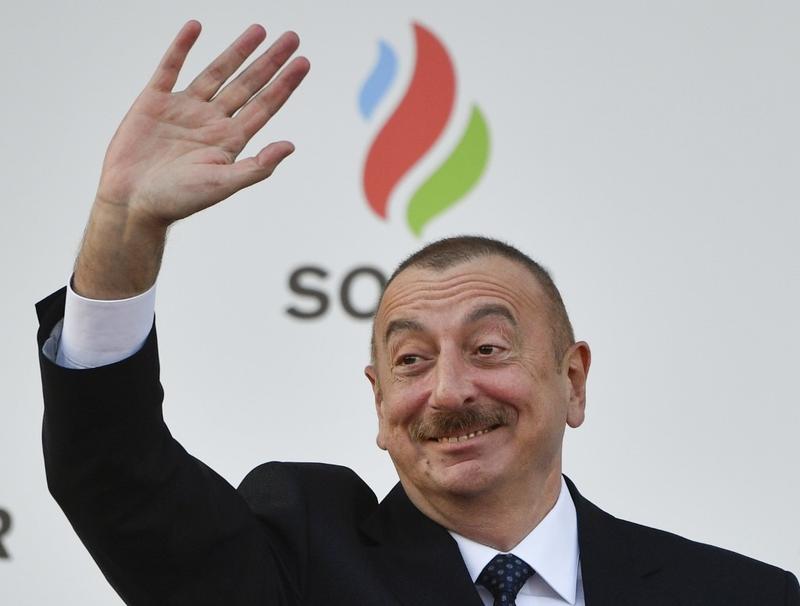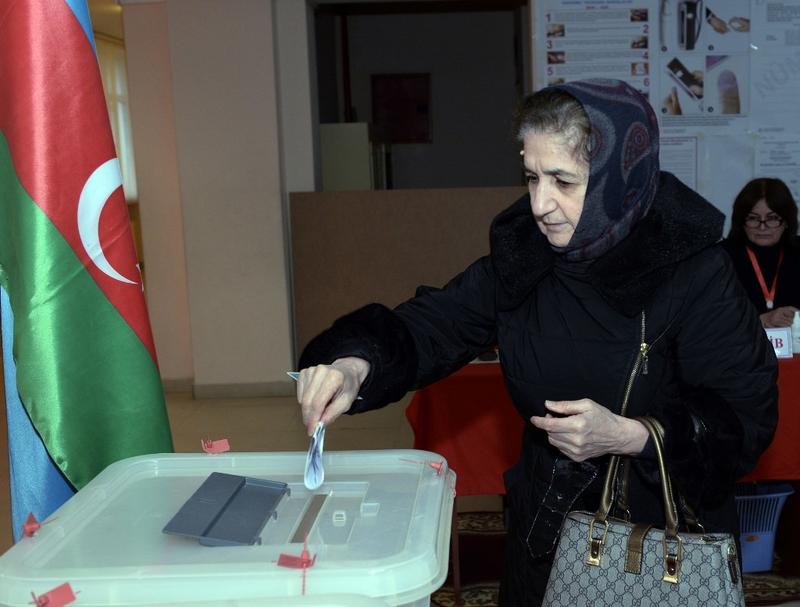 Azerbaijan's President Ilham Aliyev waves during the podium ceremony after the Formula One Azerbaijan Grand Prix in Baku on April 28, 2019. (ALEXANDER NEMENOV / AFP)
Azerbaijan's President Ilham Aliyev waves during the podium ceremony after the Formula One Azerbaijan Grand Prix in Baku on April 28, 2019. (ALEXANDER NEMENOV / AFP)
BAKU — Azerbaijan's ruling party has retained its parliamentary majority, according to initial election results announced on Monday.
Azerbaijan started its first ever snap parliamentary elections on Sunday to renew its dissolved 125-member top legislative body
The New Azerbaijan Party (YAP) secured at least 65 seats in the 125-member National Assembly of the South Caucasus nation, with 88.19 percent of the total votes counted, according to the country's election commission.
Voter turnout was 47.81 percent.
Azerbaijan started its first ever snap parliamentary elections on Sunday to renew its dissolved 125-member top legislative body.
A record number of 1,314 candidates, of which 21 percent were women, stood for parliamentary seats. A total of 246 candidates were nominated by 19 political parties, including 122 by the ruling YAP.
Some 77,800 local and 883 international observers representing 59 international organizations and 58 countries monitored the voting.
Azerbaijan's parliamentary elections were initially set for October 2020. Last December, the legislative body approved dissolving itself and holding early elections, citing the need to keep up with the pace of ongoing reforms in the country. On Dec. 5, President Ilham Aliyev signed an order to dissolve parliament and set the time for snap elections.
A record number of 1,314 candidates, of which 21 percent were women, stood for parliamentary seats. A total of 246 candidates were nominated by 19 political parties, including 122 by the ruling YAP
Focus on reform
In October, Aliyev dismissed his influential chief-of-staff, Ramiz Mehdiyev, and made other high-profile changes including the appointment of 62-year-old economist Ali Asadov as prime minister.
READ MORE: Azerbaijan's Aliyev wins 7-year term on top of 15 served
The president criticized the pace of economic reforms and said he wanted to clear out government officials who had reached pensionable age, a move seen as intended to force out people from the era of his father, Heydar Aliyev.
Sunday’s election - while not a full democratic contest - pits veteran lawmakers against young, Western-educated candidates from the same, ruling party in an effort to overhaul the legislature with more able technocrats, analysts say.
“I would call this an authoritarian modernization project,” said Thomas de Waal, a Caucasus expert at the Carnegie Endowment for International Peace think-tank.
“Old Soviet-style bureaucrats are being pushed out and younger more professional figures are being given top jobs.”
Despite its energy resources, the South Caucasus country on the Caspian Sea struggles with unemployment, and many of the 10 million population see little benefit from the oil and gas it produces.
ALSO READ: Azerbaijan's incumbent president set up for easy re-election
The mainstream opposition accused the ruling party, which has governed for almost three decades, of holding the vote in unfair conditions.
“We are already observing a number of violations in polling stations where we have observers,” the opposition Musavat Party’s leader, Isa Gmbar, told Reuters.
A shake-up of the governing elite is not expected to bring any change in foreign policy. Azerbaijan is not aligned to any big regional grouping such as the European Union or the Russia-led Eurasian Economic Union and its foreign policy is balanced between Russia, the West and Iran.
 A woman votes at a polling station during the parliamentary elections in Baku on Feb 9, 2020. (TOFIK BABAYEV / AFP)
A woman votes at a polling station during the parliamentary elections in Baku on Feb 9, 2020. (TOFIK BABAYEV / AFP)
Some voters said they felt things were getting better.
“After personnel changes and reforms initiated by the president, I have hope for the future and think the country is on the way to improving the situation,” Alia Gafarova, a teacher, said after casting a ballot at a polling station in central Baku.
Aliyev has held power since he was elected in October 2003, two months before the death of his father who held power for a decade. He won elections in 2008, 2013 and 2018, and two separate referendums scrapped a two-term presidential limit and extended the presidential term to seven years from five.
He appointed his wife Mehriban Aliyeva first vice president, the second most powerful post after the president, in 2017.



